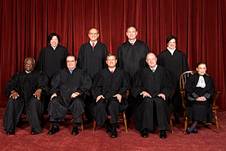 The United States Supreme Court has given an implicit "thumbs down" to television coverage of next week's three days of oral argument on the legal challenges to the Patient Protection and Affordable Care Act, aka Obamacare. Facing a tsunami of public interest in the case, the Court announced that it will release same-day audio recordings and transcripts.
The United States Supreme Court has given an implicit "thumbs down" to television coverage of next week's three days of oral argument on the legal challenges to the Patient Protection and Affordable Care Act, aka Obamacare. Facing a tsunami of public interest in the case, the Court announced that it will release same-day audio recordings and transcripts.
Meanwhile, Washington elites are in a mad scramble for seats, according to the Wall Street Journal's The A-Hed. Of the 400 tickets available for each day of arguments, most are allocated among the litigants, their attorneys, media, and members of the Supreme Court Bar.
The real free-for-all is over each justice's personal cache of nine seats. Former Obama White House adviser Ezekiel Emanuel is among many in the upper crust vying for a ticket, according to the The A-Hed.
As the justices dole out their 81 seats among the Washington cabal, the general public is left groveling over a paltry 50 tickets. With John Q. Public low man on the totem pole, one wonders what that says about the Court's concern for the public's right to see its government at work.
The Court's decision to exclude cameras is not surprising. Observers believe the justices' greatest fear is the sound bite. Linguist Deborah Tannen would probably agree with the court's decision according to a recent op-ed in the Washington Post. She fears that cameras would subject the justices to a "high-stakes game of Gotcha!"
All it would take is a single instance in which a justice's performance -- or appearance -- is held up for disparagement or ridicule, for the justices to mix their attention to the content of the arguments with attention to how their performance might come across on TV.
Gotcha! or not, the Court is losing the battle for the public's respect. An astounding 75% of Americans -- across the political spectrum -- believe that the U.S. Supreme Court will be influenced by politics when it rules on the constitutionality of Obamacare according to a recent Bloomberg Poll.
The Court could redeem its image and the public's confidence by deciding the case based upon legal precedent, not partisan political views. Most legal scholars believe that the Act is constitutional, as evidenced by the American Bar Association's recent poll of academics, journalists and lawyers.
The die is cast, and the legitimacy of our highest court hangs in the balance.